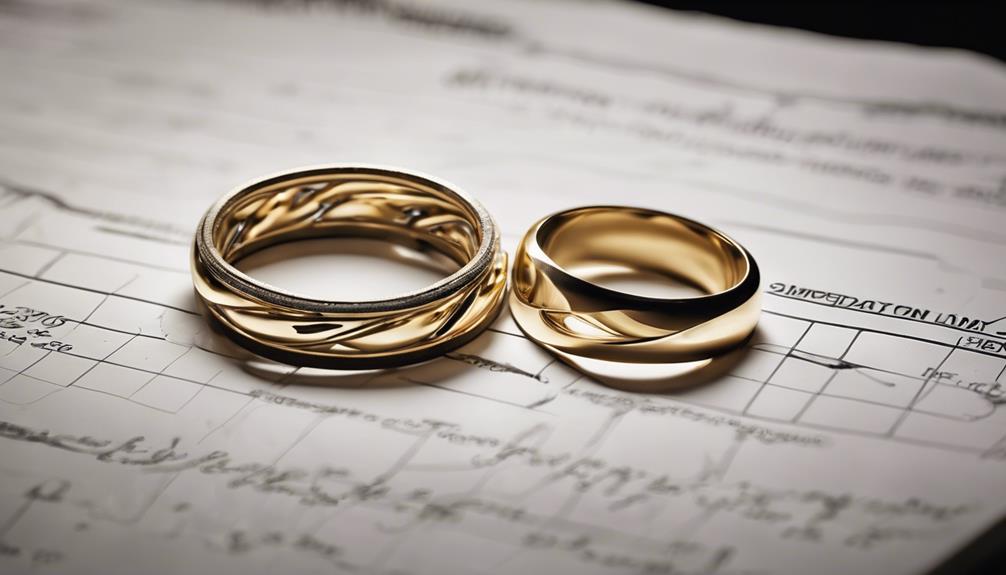In Kentucky, getting a divorce requires a mandatory separation period of at least 60 days before the divorce can be finalized. This period of separation serves as a crucial interim period, giving spouses the opportunity to reflect on their decisions and potentially work on improving their relationship before proceeding with the divorce.
However, the intricacies of this separation period go beyond just physical separation, delving into the emotional and practical aspects that can have a significant impact on the divorce process.
Key Takeaways
- In Kentucky, you need a minimum 60-day separation before finalizing a divorce.
- Separation allows time for reflection and potential reconciliation efforts.
- Living apart without sexual activity is crucial to meet divorce criteria.
- Proper adherence to separation laws is essential for a successful divorce process.
Kentucky's Grounds for Divorce
In Kentucky, the sole basis for divorce is when the marriage is deemed irretrievably broken, as outlined in legal references such as KRS § 403.170(1) and KRS § 403.170(2). This means that either spouse can assert that the marriage is irretrievably broken, providing the grounds for divorce in the state. If one spouse contests this claim, the court will examine various factors before making a decision. Additionally, residency requirements are vital in establishing the grounds for divorce in Kentucky. Understanding these legal aspects is crucial for navigating the divorce process effectively.
Kentucky's approach to divorce, focusing on the irretrievable breakdown of the marriage, emphasizes the emotional complexities involved in such legal proceedings. By recognizing this single ground for divorce, the state aims to streamline the process while ensuring that the court considers individual circumstances carefully. This legal framework underscores the importance of addressing the core issues that have led to the breakdown of the marital relationship.
Duration of Separation Requirements

Understanding the separation duration requirements in Kentucky is crucial for navigating the divorce process effectively. When considering filing for divorce in Kentucky, there are specific legal criteria regarding the duration of separation that must be met:
- Minimum of 60 Days: Spouses must live apart for a minimum of 60 days before they can file for divorce in Kentucky.
- Legal Requirement: The 60-day separation period is a legal requirement for obtaining a divorce decree in Kentucky.
- Basis for No-Fault Divorce: Living apart during the separation period is essential for establishing the basis for a no-fault divorce in Kentucky.
Meeting the separation duration requirements is vital as it plays a significant role in fulfilling the legal criteria for divorce in the state of Kentucky. By adhering to these guidelines and understanding the importance of the separation period, individuals can ensure they're on the right path towards obtaining a divorce decree in Kentucky.
Implications on Divorce Proceedings
Navigating the divorce process in Kentucky involves understanding the implications that the 60-day separation period has on divorce proceedings. In accordance with Kentucky divorce laws, this legal separation requirement serves as evidence of the irretrievable breakdown of the marriage.
During this period, spouses must live separately, even within the same residence, without engaging in sexual activity. This time apart allows for reflection on reconciliation considerations and addressing any unresolved issues before the marriage dissolution is finalized.
Compliance with the 60-day separation period is a critical compliance requirement for the court process to proceed with the divorce proceedings in Kentucky. Demonstrating adherence to this timeframe is essential to meet the state's legal requirements for divorce.
Understanding the significance of the separation period and its implications on the divorce proceedings can help individuals navigate the process more effectively and ensure compliance with the necessary legal steps for a successful marriage dissolution.
Understanding Kentucky's Separation Laws

Embarking on the journey to comprehend Kentucky's separation laws entails delving into the intricacies of the required 60-day period for divorcing couples to live separately. Understanding the nuances of Kentucky's divorce process involves recognizing the significance of this separation period, which serves as a fundamental legal requirement to establish grounds for divorce in the state. Here are three key points to consider:
- 60-Day Requirement: Couples in Kentucky must adhere to a mandatory 60-day separation period before initiating divorce proceedings.
- Meeting Requirements: Living apart during this time is essential for meeting the state's legal criteria for divorce.
- Property Division and Child Custody: The separation period allows couples to address critical issues such as property division and child custody arrangements before finalizing the divorce.
Kentucky's status as a no-fault state underscores the importance of abiding by the prescribed separation period to navigate the divorce process efficiently. By understanding and adhering to these separation laws, couples can work towards a smoother transition towards legal dissolution.
Filing for Divorce in Kentucky
To initiate the divorce process in Kentucky, spouses must first meet the mandatory requirement of living apart for a minimum of 60 days. This separation period is a crucial step in filing for divorce in Kentucky as it's a legal requirement for obtaining a divorce decree.
During these 60 days, couples can reflect on their situation, make informed decisions, and begin the divorce process with clarity and purpose. It's important to note that the separation period doesn't necessarily mean physically living in separate residences; spouses can fulfill this requirement by residing in the same household as long as they aren't engaging in sexual activity.
Frequently Asked Questions
Do You Have to Be Legally Separated Before Divorce in Ky?
We don't have to be legally separated before divorce in Kentucky. The state requires a 60-day separation period, but legal separation isn't mandatory. Living apart without sexual relations during this time is essential for obtaining a divorce decree.
What Is the Fastest Way to Get a Divorce in Kentucky?
We understand the urgency. Filing together, meeting legal requirements promptly, and cooperating can expedite a divorce in Kentucky. Communicate openly, seek legal guidance, and adhere to court procedures for the quickest resolution.
What Are the Divorce Laws in Kentucky 2023?
In Kentucky in 2023, divorce laws require spouses to live apart for 60 days before finalizing a divorce. This separation period allows the court to evaluate the marriage's viability. Our experience shows this step is crucial for the divorce process.
How Much Does Divorce Cost in Ky?
Divorce costs in Kentucky can be like navigating a maze – ranging from $113 to $153 initially. Factors like legal representation, property division, and child custody can influence the total expenses, impacting financial planning.
Conclusion
In conclusion, in Kentucky, couples must be separated for at least 60 days before they can finalize their divorce. This waiting period allows for reflection and consideration before making such a life-changing decision.
Interestingly, statistics show that couples who go through a period of separation before divorcing are more likely to have an amicable and smoother divorce process, leading to better co-parenting relationships in the future.











